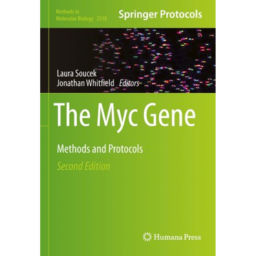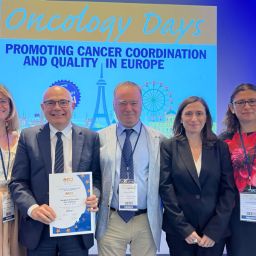
- The multicenter randomized phase III BREAKWATER trial, spearheaded by VHIO, is the first to evaluate the combination of study drugs encorafenib and cetuximab plus chemotherapy vs. standard of care chemotherapy as first-line in patients with previously untreated BRAFV600E metastatic colorectal cancer.
- Latest safety and anti-tumor activity data from the safety lead-in part of this study presented by VHIO’s Director Josep Tabernero now show that the combination of encorafenib and cetuximab plus chemotherapy is generally tolerable .
- The phase III global FRESCO-2 study co-authored by VHIO’s Josep Tabernero and Elena Élez evaluated the efficacy and safety of anti-VEGRF tyrosine kinase inhibitor fruquintinib in patients with heavily pretreated metastatic colorectal cancer.
- Data presented by lead investigator Arvind Dasari, University of Texas MD Anderson (Houston, USA), evidence that fruquintinib had significant antitumor activity and a favorable safety profile.
- The open-label phase II MOUNTAINEER clinical trial assessed the investigational combination of targeted therapy with HER2 inhibitor tucatinib plus monoclonal antibody trastuzumab in patients with chemotherapy refractory HER2-positive RAS wild-type metastatic colorectal cancer.
- Results of additional safety and efficacy analyses presented by study lead John H. Strickler, Duke University Medical Center (Durham, USA), show that this combination achieved optimal clinical benefit and was well tolerated.
An estimated 1.9 million new colorectal cancer (CRC) cases and 935,000 deaths occurred in 2020 worldwide, representing about one in 10 cancer cases and deaths. Overall, CRC is the third most common malignancy and ranks second in terms of mortality (1), and cases are set to soar. The global number of new cases is predicted to reach 3.2 million in 2040, with a rising incidence of CRC at younger ages (before age 50 years) (2).
Over recent years research advances have led to an improved understanding of the pathophysiology of CRC and an increasing array of more potent and personalized treatment options. These developments have led to improved survival in patients with this disease. The overall 5-year survival rate for CRC is an estimated 64%, and if diagnosed at a localized stage it reaches 91%. In the metastatic setting however, the 5-year survival rate drops to 14%, representing an unmet, urgent clinical need.
Aimed at improving patient outcomes in refractory metastatic CRC, results of various clinical studies presented during the annual Congress of the European Society for Medical Oncology (ESMO), 09 – 13 September, Paris, France, show promise in opening up novel, more effective treatment avenues, three of which counted on the participation and expertise of VHIO investigators. Results of the BREAKWATER (3), FRESCO-2 (4) and MOUNTAINEER (5) clinical studies, all selected as late-breakers, were presented and discussed on the ground during this week’s ESMO Congress 2022.
Encorafenib plus cetuximab with/without chemotherapy as a potential first treatment for patients with metastatic colorectal cancer
The BRAFV600E mutation is found in around 10% of metastatic colorectal cancer (mCRC) and it is associated with a poor prognosis with a median overall survival of less than 20 months. Patients with BRAF V600E-mutant CRC are generally refractory to current therapies and rapidly develop cancer drug resistance. Only recently has progress been made in more effectively treating these patients.
Results of the phase III BEACON study (6) that were presented by VHIO’s Director Josep Tabernero at the ESMO Congress 2019, showed that combined targeted therapy including BRAF inhibitor encorafenib and EGFR inhibitor cetuximab significantly improves overall survival and increases response rates compared with standard of care in these patients. These results led to the widespread approval of this doublet regimen as second- and third-line.
Based on this practice-changing trial, the multicenter randomized phase III BREAKWATER (3) study, led by Josep Tabernero, is the first to evaluate whether encorafenib plus cetuximab with chemotherapy, can improve clinical outcomes relative to current standard of care chemotherapy in patients with previously untreated BRAF V600E-mutant mCRC.
“Given that encorafenib has not previously been combined with chemotherapy, the main objective of the safety lead-in portion of this trial was to assess the tolerability and safety of this regimen. Evaluated in separate cohorts, we also sought to establish the best chemotherapy to be used in the phase III portion of this study,” says Josep Tabernero, Head of the Medical Oncology Department at the Vall d’Hebron University Hospital (Vall d’Hebron Barcelona Hospital Campus), first author of this present study, and Past-President of ESMO.
Data from the safety lead-in portion of this study, have now been presented by VHIO’s Director Josep Tabernero at ESMO Congress 2022, and show that this combination achieves promising antitumor activity and is generally tolerable, especially when compared with first-line chemotherapy in these patients.
“This study is the first to evaluate this combination of treatments as first-line therapy. To-date this strategy has only been assessed in previously treated patients with advanced and progressive disease,”
The BREAKWATER investigators assessed the safety and preliminary anti-tumor activity data of the combination of encorafenib plus cetuximab with two of the most common first-line chemotherapy regimens in colorectal cancer, either mFOLFOX6 (leucovorin calcium-fluoroucacil-oxaliplatin), or FOLFIRI (calcium leucovorin-fluorouracil-irinotecan hydrochloride).
“Findings show that in general the combination of encorafenib and cetuximab plus chemotherapy is tolerable. We have observed that encorafenib did not notably alter oxaliplatin exposure using mFOLFOX6,” adds Elena Élez, a Senior Clinical Investigator of VHIO’s Gastrointestinal and Endocrine Tumors Group and co-author of this present study.
“Our data are especially encouraging when compared with the historical results of chemotherapy as first-line therapy in patients with previously untreated BRAF V600E-mutant metastatic colorectal cancer,” adda Élez.
While efficacy data are not yet mature since the primary endpoint of this research was the frequency of dose-limiting toxicities, promising antitumor activity has been observed in all patients receiving the different combinations of drugs, justifying the continuation of the phase III portion of the study, which is already underway.
Due to the lack of interaction between encorafenib and oxaliplatin, the combination of encorafenib and cetuximab plus mFOLFOX6 will be used in this subsequent phase.
Fruquintinib as a potential new treatment option in more heavily pretreated refractory metastatic colorectal cancer
In colorectal cancer the vascular endothelial growth factor (VEGF) is a key driver of angiogenesis which promotes tumor growth and cancer cell spread. Over recent years a suite of tyrosine kinase inhibitors (TKIs) have been developed to block VEGF receptors from sending growth signals into the blood vessel cells.
Fruquintinib is a potent and highly selective small molecule inhibitor of VEGFR-1, -2 and -3. Based on the results of the first FRESCO randomized phase III clinical trial (7) fruquintinib received its first approval in China for use in the treatment of metastatic colorectal cancer (mCRC) in patients who have failed at least two prior systemic anti-neoplastic therapies.
This positive outcome led to the development of the FRESCO-2 (4) global phase III multiregional clinical trial evaluating the efficacy and safety of fruquintinib in more heavily pretreated patients with mCRC, reflective of current global treatment practices.
Co-authored by VHIO’s Josep Tabernero and Elena Élez, FRESCO-2 enrolled 687 patients with refractory mCRC and was designed to compare treatment with fruquintinib plus best supportive care versus placebo and best supportive care.
Data presented at this week’s ESMO Congress 2022 by lead investigator Arvind Dasari, University of Texas MD Anderson (Houston, USA), show that this study met its primary endpoint of overall survival (OS) and the key secondary endpoint of progression-free survival (PFS). Fruquintinib versus placebo achieved a median OS improvement of 2.6 months and a median PFS improvement of 1.9 months. Superior OS and PFS were consistent across all pre-specified subgroups.
“Although these data may seem limited, it is important to consider that these patients have very advanced disease with no other current treatment options available. Identifying and developing more effective treatment strategies for this patient population therefore represents an unmet clinical need,” observes Elena Élez, co-investigator of this present study.
“Fruquintinib monotherapy was well tolerated, and safety data was consistent with the profile evidenced by the first FRESCO study. Our data further support results of the first FRESCO phase III and could open up a new treatment avenue for patients with metastatic colorectal cancer,” concludes Élez.
Seeking out a new treatment option for heavily pretreated patients with HER2-positive metastatic colorectal cancer
Amplification or overexpression of the HER2 protein occurs in between 3 to 5% of all patients with metastatic colorectal cancer (mCRC). In patients with RAS and BRAF wild-type disease this rate is higher, upwards of 10%. Patients with HER2-positive (HER2+) mCRC and disease progression on early lines of chemotherapy receive limited clinical benefit from current standard of care treatments.
The multicenter phase II open-label MOUNTAINEER study was initiated to evaluate the efficacy and safety of tucatinib – a tyrosine kinase inhibitor that induces HER2-driven cancer cell death- in combination with trastuzumab – a monoclonal antibody that binds to the HER2 protein and prevents the division and growth of cancer cells, in patients with HER2+ RAS wild-type chemotherapy refractory mCRC.
Presented during at ESMO Congress 2022 (5) by study lead John H. Strickler, Duke University Medical Center (Durham, USA), results of additional safety and efficacy analyses reported by the MOUNTAINEER investigators including VHIO’s Elena Élez, show that upfront dual HER2-targeting with tucatinib plus trastuzumab achieved optimal clinical benefit and was well tolerated.
MOUNTAINEER, the largest prospective trial to date for patients with HER2+ mCRC, enrolled 116 heavily pretreated patients with HER2+ and RAS wild-type mCRC with progression on or intolerance to chemotherapy and an anti-VEGF antibody. These patients were divided into three cohorts: two groups received a combination of tucatinib and trastuzumab and the other patients were treated with tucatinib monotherapy with the possibility of cross over upon progression.
With a median follow-up of just over 20 months, patients who received the combined treatment achieved an objective response rate of 38.1%, with a median duration of response of 12.4 months. In contrast, the objective response rate to tucatinib monotherapy was 3.3%. Preliminary data show progression-free survival of 8.2 months with overall survival exceeding two years.
“The upfront dual HER-2 targeting with the tucatinib and trastuzumab doublet achieved optimal clinical benefit, was well tolerated, and showed a similar safety profile in patients who crossed over from tucatinib monotherapy and in those who initially received the combination, monotherapy,” says Elena Élez, a co-author of this present study.
With sustained response and favorable tolerability in heavily pretreated patients, this novel combination could promise a new standard of care in patients with previously treated HER2-positive RAS wild-type metastatic colorectal cancer.
“Our data also provide the rationale to bring this treatment strategy into earlier lines of therapy. MOUNTAINEER-03 is now recruiting patients to evaluate tucatinib with trastuzumab plus mFOLFOX6 standard of care treatment in first-line HER2-positive metastatic colorectal cancer,” concludes Élez.
References:
1. Sung H, Ferlay J, Siegel RL, Laversanne M, Soerjomataram I, Jemal A, Bray F. Global Cancer Statistics 2020: GLOBOCAN Estimates of Incidence and Mortality Worldwide for 36 Cancers in 185 Countries. CA Cancer J Clin. 2021 May;71(3):209-249.
2. Keum N, Giovannucci E. Global burden of colorectal cancer: emerging trends, risk factors and prevention strategies. Nat Rev Gastroenterol Hepatol. 2019 Dec;16(12):713-732.
3. LBA26 – BREAKWATER safety lead-in (SLI): Encorafenib (E) + cetuximab (C) + chemotherapy (chemo) for BRAFV600E metastatic colorectal cancer (mCRC). J Tabernero, T. Yoshino, T.W. Kim, R. Yaeger, J. Desai, H. Wasan, E. Van Cutsem, F. Ciardiello, T. Maughan, C. Eng, J. Tie, M.E. Elez Fernandez, S. Lonardi, X. Zhang, R. Chavira, T. Usari, Y. Zhang, S. Kopetz.
ESMO Congress 2022 Session details:
Mini Oral session: GI, lower digestive
Date: Monday, 12th September
Session Time: 14:45 – 15:55
Speaker: Josep Tabernero
Lecture Time: 14:45 – 14:50h
4. LBA25 – FRESCO-2: A global phase III multiregional clinical trial (MRCT) evaluating the efficacy and safety of fruquintinib in patients with refractory metastatic colorectal cancer. Arvind Dasari, Sara. Lonardi, Rocio Garcia-Carbonero, Elena Elez, Takayuki Yoshino, Alberto Sobrero, James Yao, Pilar García-Alfonso, Judit Kocsis, Antonio Cubillo Gracian, Andrea Sartore Bianchi, Taroh Satoh, Violaine Randrian, Jiri Tomasek, Geoff Chong, Zhao Yang, William Schelman, Marek Kania, Josep Tabernero, Cathy Eng.
ESMO Congress 2022 Session details:
Proffered Paper session 2: GI, lower digestive
Date: Monday, 12th September
Session Time: 10:15 – 11:45h
Speaker: N. Arvind Dasari
Lecture Time: 11:00 – 11:10h
5. LBA27 – Additional analyses of MOUNTAINEER: A phase II study of tucatinib and trastuzumab for HER2-positive mCRC. John H. Strickler, Andrea Cercek, Salvatore Siena, Thierry Andre, Kimmie Ng, Eric Van Cutsem, Christina Wu, Andrew Scott Paulson, Joleen M. Hubbard, Andrew L. Coveler, Christos Fountzilas, Adel Kardosh, Pashtoon Murtaza Kasi, Heinz-Josef Lenz, Kristen Ciombor, Elena Elez, David L. Bajor, Michael Stecher, Wentao Feng, Tanios S. Bekaii-Saab.
ESMO Congress 2022 Session details:
Mini Oral session: GI, lower digestive
Date: Monday, 12th September
Session Time 14:45 – 15:55h
Speaker: John H. Strickler
Lecture Time: 14:50 – 14:55h
6. Kopetz S, Grothey A, Yaeger R, Van Cutsem E, Desai J, Yoshino T, Wasan H, Ciardiello F, Loupakis F, Hong YS, Steeghs N, Guren TK, Arkenau HT, Garcia-Alfonso P, Pfeiffer P, Orlov S, Lonardi S, Elez E, Kim TW, Schellens JHM, Guo C, Krishnan A, Dekervel J, Morris V, Calvo Ferrandiz A, Tarpgaard LS, Braun M, Gollerkeri A, Keir C, Maharry K, Pickard M, Christy-Bittel J, Anderson L, Sandor V, Tabernero J. Encorafenib, Binimetinib, and Cetuximab in BRAFV600E-Mutated Colorectal Cancer. N Engl J Med. 2019 Oct 24;381(17):1632-1643.
7. Li J, Qin S, Xu RH, Shen L, Xu J, Bai Y, Yang L, Deng Y, Chen ZD, Zhong H, Pan H, Guo W, Shu Y, Yuan Y, Zhou J, Xu N, Liu T, Ma D, Wu C, Cheng Y, Chen D, Li W, Sun S, Yu Z, Cao P, Chen H, Wang J, Wang S, Wang H, Fan S, Hua Y, Su W. Effect of Fruquintinib vs Placebo on Overall Survival in Patients With Previously Treated Metastatic Colorectal Cancer: The FRESCO Randomized Clinical Trial. JAMA. 2018 Jun 26;319(24):2486-2496.


























